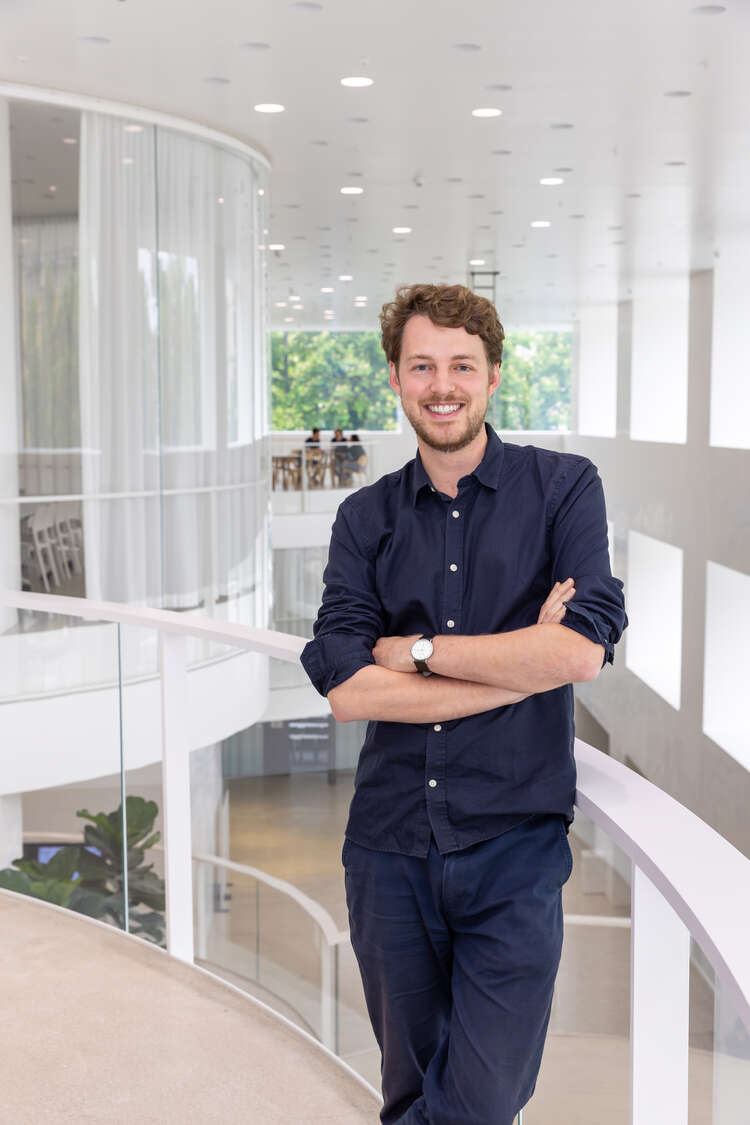Boundless Research
David Brückner loves research at the interface between biology and physics. He has often crossed national borders in its pursuit: He studied in Cambridge, earned his PhD in Munich, and moved to Vienna for a postdoc. Now, he has started a new role as Assistant Professor of Biophysics at the Biozentrum. His research is his passion, and yet, he doesn’t need a lab to do it.
Your academic path kicked off in Cambridge, where you spent quite some years. But what about the time before? Where did you grow up?
I was born in Hamburg but grew up and went to school in Osnabrück. When I was 15, I did a year abroad at a boarding school near Brighton in England. During that time, my parents moved to Freiburg. So I ended up staying in England and did my A-levels there.
So, you basically left home at the age of 15. And after school, you went straight on to study at Cambridge?
Yes, that’s right. The original plan was to spend just a year in the UK. In the end, it turned into six. I did my Bachelor’s degree in Natural Sciences in Cambridge, for which I received a scholarship from a German foundation.
What did you mainly focus on during your degree?
I concentrated on physics and went on to do my master's in theoretical physics. But even back in high school, somewhere in the back of my mind, I always dreamt of one day combining the mathematical logic of physics with the complex questions posed by biology.
And when did biology really come into the picture?
That really happened during my PhD at LMU Munich. That’s when I realized how fascinating it is to explore biological questions scientifically. So, I specifically looked for PhD projects in biophysics. Even then, I wanted to use physics to understand complex biological systems − and that’s pretty much what I’m still doing today.
After your PhD, you went to Austria as a postdoc. Why did you decide to go there?
As a PhD student, I was working on single cell behavior from a relatively physic-oriented perspective. In my postdoc, I really wanted to dive into embryogenesis research, and answer questions that are relevant from biological perspective.
And what does your group focus on today?
Roughly speaking, we are searching for physical principles in complex biological systems. We’re especially interested in how cells interact with each other in order to organize collective behavior − mainly in the context of embryogenesis. At the start, all cells are identical stem cells. Over time, different cell types must develop, patterns have to emerge and the whole process needs be coordinated in such a way that the embryo ends up with its desired three-dimensional shape. We develop mathematical models that describe the process of embryogenesis and try to find underlying principles.
So, your group doesn’t do experiments? Do you actually need a lab at all?
No, we mainly need collaboration partners whose do the experiments which we use to constrain our mathematical models. Then, the goal is that we make predictions, which can then again be tested in experiment.
Who are your experimental collaboration partners and which model organisms do they work with?
Here in Basel, we work for example with Prisca Liberali, at the FMI and now also at the D-BSSE. Her group works with organoids. But we also work internationally with groups in the USA, Belgium and Austria, among others.

David Brückner studied physics and natural sciences at the University of Cambridge and completed his PhD in physics at LMU Munich in 2021. Most recently, he was an EMBO and NOMIS postdoctoral fellow at the Institute of Science and Technology Austria (ISTA). In 2022, David Brückner was awarded the Gustav Hertz Prize of the German Physical Society.
What attracted you to the Biozentrum? Did you already have contacts here?
I didn’t know anyone here personally when I applied − just some of the PIs by name. It’s actually not easy to find institutes that support truly interdisciplinary research the way the Biozentrum does. It was important to me that both physics and biology have a high priority, and that there’s a clear overlap in biophysics. And indeed, the Biozentrum is pretty unique in that regard.
Are there potential collaborators or key facilities here for your research?
Definitely. There’s shared interests with Alex’s group − he works on zebrafish embryogenesis − and with Knut and Jean, who focus on other aspects of multicellular life. At the molecular level, Rod’s group could also be an interesting fit, especially when it comes to how single cells transmit or respond to signals. And when it comes to the facilities, it is primarily research IT that is important for our research.
Even as a dedicated researcher − can you switch off sometimes?
I do think about research a lot. But before starting at the Biozentrum, I took two months off and backpacked across Southeast Asia. I was scuba diving there – but close to the shore, to avoid getting seasick! (laughs) I truly switched off during that time.


